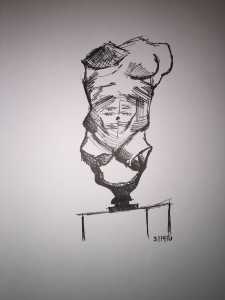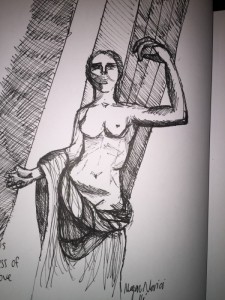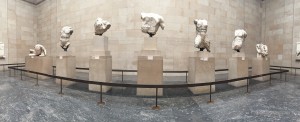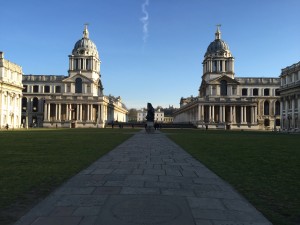After visiting The British Museum and seeing all it has to offer, there is absolutely no doubt in my mind that it is an AMAZING museum. It does a great job at showcasing world history in an easy-to-view fashion. Also, most importantly, the staff take care of the artifacts with care. I do, however, think that several of the artifacts there are not where they belong. I am referring mostly to the fargments of sculpture “saved” from the Acropolis in Athens. This piece of the Parthenon tells a story. When the Parthenon was whole, the story complimented the religious place it was presented at. This story can only be whole when presented at the location intended by the artists. To put this into prospective, if Big Ben was removed from London and was brought to, for example, Switzerland, would the contex of the building remain? Would the purpose of law and justice be retained? These questions are important when concerning vital Greek culture as well. With Greece having little to no authority in the world, they may never be given back what was stolen from them. I hope one day the English government puts this into prospective!
Other than that, our trip to Greenwich was very cool and informative and I liked being able to experience the city in a new context from the river. 






Dearest Meg,
I am so glad that you felt inclined to comment on this interestingly controversial issue. I think you hit it right on the head that the context of the Parthenon’s origin tells a story, and that story is important. Walking through the space I couldn’t help but to feel a deep sadness. Despite its superb artistic mastery, the gravity of its importance felt almost viscerally heavy. It transcends objecthood into maintaining it’s own spirit and life. It establishes itself from antiquated artifact to sorrowful embodiments of a nation. The history that accompanies these treasures are what give them their enduring life. To me, this transcendence is a result of the ideology that originated its displacement. I think of my understanding of the English culture today and take a peek backwards. It becomes clear that cultural appropriation is very much at the heart of their culture. Historically, the English are notorious for colonialization. Impeding upon entire peoples with hands of oppression, the goods and services these peoples and places provided made up a large part of their economy. The import and export of goods perpetuated this cycle of sourcing products externally; this resulted in cultural appropriation. Many of the goods that make up the fabric of England’s cultural fabric are weaved from outsourcing. A nation’s identity becomes a result of continual architectural, literary, scientific, religious and food-related appropriations. Our walking tour guide even made this a prevalent point in regards to the English’s continual use of other nations styles in the construction of their architecture. In this specific case, I think of the sorrow that is the displacement of the Parthenon from its riteful place in Greece as a perfect representation of an ideology that has survived: England is entitled to conquer and own, cherish and protect, and displace and house anything they want. It is a behavior that has existed for thousands of years; today, we only face a confrontation of this ideological struggle in which the right thing to do is to return it to its home while the hard thing to do is to hault a continuation of your own appropritatative culture.
Kendra
I agree with you 100%, Kendra! I feel as though the English have always taken and stolen without regard to other cultures. This disregard speaks of the values of the modern English government. English culture pops up across the world due to imperialism in the 20th century. From deep in the jungles of southern Africa, to the densest of communities on India, to the eastern Atlatic coast of the north-eastern United States, English presence still prevails. So with the English retaining their control over one of the most vital parts of Greek culture, this almost ancient notion of imperialism is still pre leant even today. With a new, and more understanding view on a country’s land and property, this should no longer be an issue.